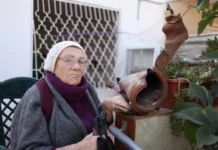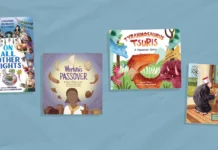
In an email about his Holocaust memoir, “My Mother’s War,” Michael Fryd explained why he didn’t want to write a typical remembrance story.
“I didn’t want another Holocaust tale of woe describing human cruelty in gory detail, because repetition of indescribable atrocities numbs our souls and reduces the Holocaust to an abstract historical event one can study, analyze, intellectualize, discuss in generalities.”
Instead, he wrote one about his mother, Evelyn Fryd.
She is the reason he’s still here, in Philadelphia, a Holocaust survivor, a retired scientist, a father of four, a husband of nearly 50 years. She also had to scam, lie and circumvent her way to freedom in New York City with her son and her husband/Michael’s father, Saul Fryd. (Michael Fryd later moved to Philadelphia during his professional career.)
“My Mother’s War” will be published in August by Story Sanctum, an independent publisher. Fryd, 86, originally wanted to be a writer. He also wanted to honor his mother and give his children a better understanding of their history.
“I loved my mom, and I admired her,” Fryd said.
Evelyn Fryd grew up in a Polish shtetl and was smart and ambitious, according to her son. But since she was a woman in a Chasidic community, her ambition was stifled. She was supposed to just be a good wife. As a little girl, she learned to get around people and educate herself.
Later, Evelyn, Saul and Michael were living in a small Polish town when they were forced by the Nazis into a Jewish ghetto near Warsaw. Evelyn Fryd was one of the only Jews who was able to go out, travel around to local farms and bring back food. She often came back with 200 pounds of wheat.
The Nazis would catch Fryd. But she would always get out of it by saying something like, “Oh, this is where the Jews live?”
“She always invented some lie to get away,” Michael Fryd said.
One time, a Polish officer of German origin was about to take Fryd to get shot. She knew he had a young son, so she told him she wanted to send a message to her son.
“I know you must take me to the Germans. But I want to send a message to my son,” Fryd recalled. “Take me to your house. I’ll tell it to your wife.”
The officer obliged, and his wife chased him out of the house. Evelyn Fryd got her chance to leave.
“She was a quick thinker,” Michael Fryd said.
Later in the war, she came to an agreement with a local farmer for her family to stay in his root cellar. When the family’s money to pay the farmer started to run out, Evelyn Fryd went to another Polish family to ask for more.
“She found this Polish family and said, ‘We Jews are all rich. We’re richer than anybody. We have this fortune in diamonds and gold that we buried, but we’re not liquid. If you give us this money to keep paying the farmer, I’ll give you money when the war ends,’ Michael Fryd recalled.
After the war, the family returned to its Polish town. Evelyn Fryd knew that Russian soldiers loved big, fancy watches. So, she bought alarm clocks, put armbands on them and exchanged the watches for “whatever goods we needed,” her son said.
The Fryds were eventually arrested for black marketeering in Poland, and Michael Fryd spent time in orphanages. When the parents got out, they went with their son to a displaced persons camp in Czechoslovakia and got one of 5,000 visas sent over from France. The family immigrated to Paris and lived in a hotel that was also a bordello.
Evelyn Fryd convinced the hotel manager, a pimp, to let her rent out the rooms. She rented them to refugees.
“She always made money,” Michael Fryd said. “It was more her personality than her looks. When she came into a room, she took it over.”
The son recognized this quality in his mother when he was 5. It was hard to miss, he recalled. Even after the family got to New York, she bought clothes from failing garment businesses and resold them to other stores.
“The sad part is, she didn’t know how to stop,” her son said. “Even when it wasn’t necessary, she felt she had to be smarter, better, quicker than anybody else.”
Occasionally, the son was “embarrassed” by his mother’s behavior, he added. But he also always remembered.
“She gave me life twice,” he said.






